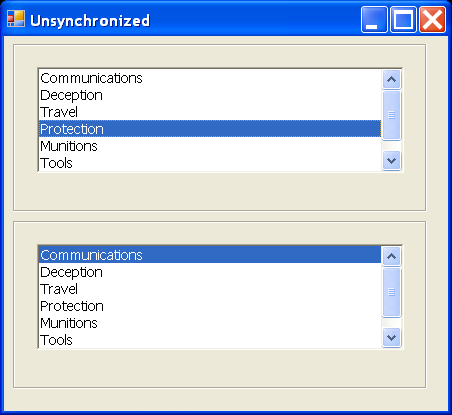ADO.NET Binding : Unsynchronized

/*
User Interfaces in C#: Windows Forms and Custom Controls
by Matthew MacDonald
Publisher: Apress
ISBN: 1590590457
*/
using System;
using System.Drawing;
using System.Collections;
using System.ComponentModel;
using System.Windows.Forms;
using System.Data;
namespace ADO.NET_Binding
{
/// <summary>
/// Summary description for Unsynchronized.
/// </summary>
public class Unsynchronized : System.Windows.Forms.Form
{
internal System.Windows.Forms.GroupBox grp;
internal System.Windows.Forms.ListBox lstProduct;
internal System.Windows.Forms.GroupBox grpCategory;
internal System.Windows.Forms.ListBox lstCategory;
/// <summary>
/// Required designer variable.
/// </summary>
private System.ComponentModel.Container components = null;
public Unsynchronized()
{
//
// Required for Windows Form Designer support
//
InitializeComponent();
//
// TODO: Add any constructor code after InitializeComponent call
//
}
/// <summary>
/// Clean up any resources being used.
/// </summary>
protected override void Dispose( bool disposing )
{
if( disposing )
{
if(components != null)
{
components.Dispose();
}
}
base.Dispose( disposing );
}
#region Windows Form Designer generated code
/// <summary>
/// Required method for Designer support - do not modify
/// the contents of this method with the code editor.
/// </summary>
private void InitializeComponent()
{
this.grp = new System.Windows.Forms.GroupBox();
this.lstProduct = new System.Windows.Forms.ListBox();
this.grpCategory = new System.Windows.Forms.GroupBox();
this.lstCategory = new System.Windows.Forms.ListBox();
this.grp.SuspendLayout();
this.grpCategory.SuspendLayout();
this.SuspendLayout();
//
// grp
//
this.grp.Controls.AddRange(new System.Windows.Forms.Control[] {
this.lstProduct});
this.grp.FlatStyle = System.Windows.Forms.FlatStyle.System;
this.grp.Location = new System.Drawing.Point(6, 137);
this.grp.Name = "grp";
this.grp.Size = new System.Drawing.Size(280, 136);
this.grp.TabIndex = 5;
this.grp.TabStop = false;
//
// lstProduct
//
this.lstProduct.Location = new System.Drawing.Point(16, 24);
this.lstProduct.Name = "lstProduct";
this.lstProduct.Size = new System.Drawing.Size(248, 95);
this.lstProduct.TabIndex = 1;
//
// grpCategory
//
this.grpCategory.Controls.AddRange(new System.Windows.Forms.Control[] {
this.lstCategory});
this.grpCategory.FlatStyle = System.Windows.Forms.FlatStyle.System;
this.grpCategory.Location = new System.Drawing.Point(6, 0);
this.grpCategory.Name = "grpCategory";
this.grpCategory.Size = new System.Drawing.Size(280, 136);
this.grpCategory.TabIndex = 4;
this.grpCategory.TabStop = false;
//
// lstCategory
//
this.lstCategory.Location = new System.Drawing.Point(16, 24);
this.lstCategory.Name = "lstCategory";
this.lstCategory.Size = new System.Drawing.Size(248, 95);
this.lstCategory.TabIndex = 0;
//
// Unsynchronized
//
this.AutoScaleBaseSize = new System.Drawing.Size(5, 14);
this.ClientSize = new System.Drawing.Size(300, 290);
this.Controls.AddRange(new System.Windows.Forms.Control[] {
this.grp,
this.grpCategory});
this.Font = new System.Drawing.Font("Tahoma", 8.25F, System.Drawing.FontStyle.Regular, System.Drawing.GraphicsUnit.Point, ((System.Byte)(0)));
this.Name = "Unsynchronized";
this.Text = "Unsynchronized";
this.Load += new System.EventHandler(this.Unsynchronized_Load);
this.grp.ResumeLayout(false);
this.grpCategory.ResumeLayout(false);
this.ResumeLayout(false);
}
#endregion
private void Unsynchronized_Load(object sender, System.EventArgs e)
{
// Make sure all the controls in this group box have a different binding.
grpCategory.BindingContext = new BindingContext();
DataSet dsStore = new DataSet();
dsStore.ReadXmlSchema(Application.StartupPath + "\\store.xsd");
dsStore.ReadXml(Application.StartupPath + "\\store.xml");
lstCategory.DataSource = dsStore.Tables["Categories"];
lstCategory.DisplayMember = "CategoryName";
lstProduct.DataSource = dsStore.Tables["Categories"];
lstProduct.DisplayMember = "CategoryName";
}
[STAThread]
static void Main()
{
Application.Run(new Unsynchronized());
}
}
}
 ADO.NETBinding.zip( 76 k)
ADO.NETBinding.zip( 76 k)Related examples in the same category